冠词-名词-代词
名词、冠词、代词知识点

名词一、名词的复数:1.名词变复数的规则形式1).一般情况下直接加s book------books cup-----cups2).以辅音字母+y结尾的,先变y为i再加es . city-------cities family-----families3).以s、x、sh、ch结尾的加es . bus-----buses wish------wishes watch------wathes4).以o结尾的多数加S 初中阶段只有三个单词加es . tomato-----tomatoes potato------potatoes hero-----heroes5).以f、fe 结尾的,先把f、fe变v 再加es leaf----leaves self---selves shelf----shelves life----lives thief---thieves2.少数名词的复数形式是不规则的man----men woman---women child----childre foot-----feet tooth----teeth mouse---mice3.单数和复数形式相同。
deer---deer fish----fish sheep----sheep Chinese ----Chinese Japanese---Japanese4.某国人的复数。
1). 中、日不变。
Chinese----Chinese Japanese---Japanese2). 英、法变。
Englishman----Englishmen Frenchman----Frenchmen3). 其余s加后面。
American -----Americans German----Germans Australian---Australians二、不可数名词:1.不可数名词:1).不能直接用数字表数量2).不能直接加a或an 3).没有复数形式4).可用some、any 、lots of、plenty of 、much 修饰5).可用“量词短语”表示2.不可数名词的数量的表示方法:a / 数字+ 量词+ of + 不可数名词 a piece of paper a cup of tea a glass of milk三、名词的所有格:1. ’s 所有格。
英语的词的分类

英语的词的分类
1. 名词:名词是表示人、事物、地点或者抽象概念的名称的词。
例如:cat, car, China, happiness。
2. 动词:动词是表示动作或者状态的词。
例如:run, write, exist。
3. 形容词:形容词是用来描述名词或者代词特征的词。
例如:big, beautiful, happy。
4. 副词:副词是用来修饰动词、形容词或者其他副词的词。
例如:very, slowly, incredibly。
5. 代词:代词是用来代替名词或者名词短语的词。
例如:I, you, he, she, it。
6. 介词:介词是用来表示名词或代词与句子其他部分之间关系的词。
例如:in, on, under。
7. 连词:连词是用来连接两个或多个词、短语或者从句的词。
例如:and, or, but。
8. 冠词:冠词是用来限制名词的词,表明名词所指的范围或者数量。
例如:a, an, the。
9. 感叹词:感叹词是用来表示强烈的感情或者引起注意的词。
例如:oh, ah, well。
10. 数词:数词是用来表示数量或者顺序的词。
例如:one, two, three; first, second, third。
词汇与语法结构—名词+冠词+代词
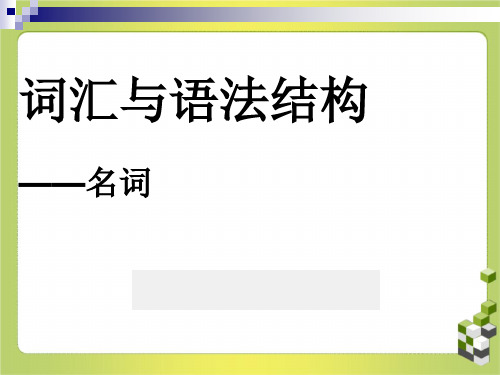
(Countable Nouns),物质名词和抽象名词一般无法用数目计
算,称为不可数名词(Uncountable Nouns)。
名词分类表
1.1 名词复数的规则变化
1.2 其它名词复数的规则变化
1) 以y结尾的专有名词,或元音字母+y 结尾的名词变复
但除人民币元、角、分外,美元、英镑、法郎等都有复数形式。 如: a dollar, two dollars; a meter, two meters
1.3 名词复数的不规则变化
3)集体名词,以单数形式出现,但实为复数。 如: people police cattle 等本身就是复数,不能说 a people,
6) 另外还有一些名词,其复数形式有时可表示特 别意思,如:goods货物,waters水域, fishes(各种)鱼
1.4 不可数名词量的表示
1)物质名词 a. 当物质名词转化为个体名词时。
比较:Cake is a kind of food. 蛋糕是一种食物。 (不可数) These cakes are sweet. 这些蛋糕很好吃。 (可数)
数时,直接加s变复数:
如: two Marys
the Henrys
monkey---monkeys holiday---holidays
比较: 层楼:storey ---storeys story---stories
2) 以o 结尾的名词,变复数时: a. 加s,如: photo---photos piano---pianos radio---radios zoo---zoos; b. 加es,如:heroes; negroes; potato—potatoes;
初中英语必掌握的知识点:名词、代词、冠词
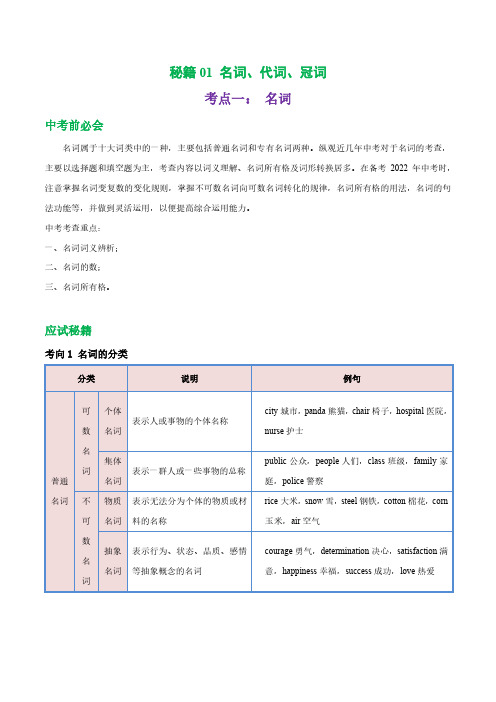
watch→watches
box→boxes
3. 以"辅音字母+y"结尾的词,把 y 变 i,再加-es。
学科网( 北京) 股份有 限公司
factory→factories
lady→ladies
4. 以 f 或 fe 结尾的词,一般把 f 或 fe 改为 v,加-es。
wolf→wolves
knife→knives
时间、距离、世界、国家、城市、团体、机构等无生命的名词直接在词尾加-’s 或-’。
five minutes’ walk
(3)双重所有格
表示所属物的名词前有冠词(a/an),数词(one,two...),不定代词(some,all,any...),物主代词(my,
your...),指示代词(this,that...时,常用"of +’s 所有格"形式,即双重所有格来表示所属关系。
的高频考点。比如名词性物主代词与形容词性物主代词的区别,疑问代词含义区分,不定代词的正确选用,
都是考查的重点。对于不同类型代词的相关知识的学习,既要全面又要有重点。
中考考查重点:
一、人称代词;
二、物主代词;
三、反身代词;
四、指示代词;
五、不定代词;
六、相互代词;
七、疑问代词。
考向 1 人称代词
1. 定义:人称代词是用来指代人、动物或事物的代词。它必须在人称(第一人称、第二人称、及第三人称)、 数(单数、复数)以及性(阴性、阳性、中性)三方面与被指代的名词一致。
The cat is small. It(此处代指第三人称单数 The dog)is Mary’ s. 2. 分类:人称代词主格和人称代词宾格
人称
主格
单数 宾格
名词代词冠词
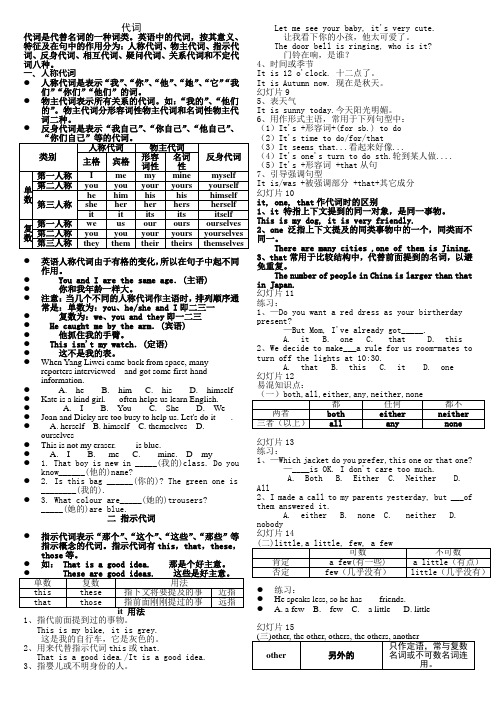
代词代词是代替名词的一种词类。
英语中的代词,按其意义、特征及在句中的作用分为:人称代词、物主代词、指示代词、反身代词、相互代词、疑问代词、关系代词和不定代词八种。
一、人称代词●人称代词是表示“我”、“你”、“他”、“她”、“它”“我们”“你们”“他们”的词。
●物主代词表示所有关系的代词。
如:“我的”、“他们的”。
物主代词分形容词性物主代词和名词性物主代词二种。
●反身代词是表示“我自己”、“你自己”、“他自己”、“你们自己”等的代词。
类别人称代词物主代词反身代词主格宾格形容词性名词性单数第一人称I me my mine myself 第二人称you you your yours yourself 第三人称he him his his himselfshe her her hers herselfit it its its itself复数第一人称we us our ours ourselves 第二人称you you your yours yourselves 第三人称they them their theirs themselves●英语人称代词由于有格的变化,所以在句子中起不同作用。
● You and I are the same age.(主语)●你和我年龄一样大。
●注意:当几个不同的人称代词作主语时,排列顺序通常是:单数为:you、he/she and I即二三一●复数为:we、you and they即一二三● He caught me by the arm.(宾语)●他抓住我的手臂。
● This isn't my watch.(定语)●这不是我的表。
●When Yang Liwei came back from space, manyreporters interviewed__and got some first-handinformation.● A. he B. him C. his D. himself ●Kate is a kind girl.___often helps us learn English.● A. I B. You C. She D. We●Joan and Dicky are too busy to help us. Let's do it ___.● A. herself B. himself C. themselves D.ourselves●This is not my eraser. ____is blue.● A. I B. me C. mine. D my● 1. That boy is new in _____(我的)class. Do youknow______(他的)name?● 2. Is this bag ______(你的)? The green one is________(我的).● 3. What colour are_____(她的)trousers?_____(她的)are blue.二指示代词●指示代词表示“那个”、“这个”、“这些”、“那些”等指示概念的代词。
英语之中名词、代词、动词、形容词、冠词、数词、副词、介词、连词、感叹词

(一)之袁州冬雪创作1、名词名词 (Nouns)是词性的一种,也是实词的一种,是指待人、物、事、时、地、情感、概念等实体或抽象事物的词. 名词可以独立成句.在短语或句子中通常可以用代词来替代.2、代词是代替名词的一种词类.大多数代词具有名词和形容词的功能.英语中的代词,按其意义、特征及在句中的作用分为:人称代词、物主代词、指示代词、自身代词、相互代词、疑问代词、关系代词和不定代词八种.3、动词,就是用来形容或暗示各类动作的词汇.基本上每一个完整的子句都有一个动词,要暗示第二个动作时可以使用不定词、动名词、对等毗连词、从属毗连词或增加子句等方法保持.根据其在句中的功能,动词可分为四类.4、形容词形容词【adjective】很多语言中均有的主要词类中的一种.主要用来修饰名词的词,暗示事物的特征5、冠词的定义冠词是置于名词之前,对名词起限制作用的一种虚词.冠词可以说是名词的一种标记,它不克不及分开名词而独立存在.冠词的分类冠词分为不定冠词"a,an"、定冠词"the"和零冠词三种6、数词暗示"多少"和"第几"的词,叫数词.其用法相当于名词或者形容词.数词分为基数词和序数词两种.暗示数目多少或顺序多少的词叫数词,数词分为基数词和序数词.7、副词(Adverb)副词的定义: 副词是一种用来修饰动词,形容词,副词或全句的词,说明时间,地点,程度,方式等概念.8、介词的定义和特征介词是一种用来暗示词与词, 词与句之间的关系的词.在句中不克不及单独作句字成分.介词后面一般有名词代词或相当于名词的其他词类,短语或从句作它的宾语.(二)1、名词,人或事物的称号3、代词,代替名词或者数词(比方some就是代替数目)3、动词,动作或状态4、数词,暗示数目或顺序(比方序数词,5th就是暗示顺序)5、形容词,人或事物的性质或状态(因为形容词一般修饰名词)6、副词,动作的特征或性状特征(因为副词一般修饰动词或形容词)7、冠词,暗示名词的泛指或特指8、介词,暗示名词或代词与其他词的关系(因为介词后面一半紧跟名词,代词或其他名词性布局)9、连词,毗连词与词,短语与短语,句子与句子10、感叹词,暗示说话时的感情或语气(三)1、adj. / a. 形容词用来描绘一类物质的性质,状态,外貌,或人的性格特点,性质,品格如:big,happy2、adv. / ad. 副词用来修饰动作或形容词,一般在句子中做状语用暗示动作的停止怎样,或暗示程度,特点,如:clearly,happily3、prep. 介词毗连地点,时间的一类词语,可以暗示方位,时间.跟一些暗示时间,地点的词连用暗示介词词组如:in,to,on,under4、conj. 连词用来毗连时间,地点,原因,成果的一类词语如:when,beacuse,so5、num. 数词暗示数字的词,既可以是基数词,也可以是序数词如:one,two,first6、int. 感叹词暗示感叹的一类词,一般不加一诠释,只代表感叹如:what,how,haurray7、vt. 及物动词(后面要加宾语)行为动作的词如:do,finish,play8、vi. 不及物动词(后面不加宾语)暗示行为动作的词如:appear9、n. 名词暗示物体,物质的词如:pig,cow,man10、pron. 代词代指一类人,事或物的词如:he,she,hers,his,things11、art = 冠词,article的缩写(四)在英语语法中主要把词分为8大类:1.名词:暗示人、物或地方等,如:John,teacher;table,pen;London;beauty.2.代词:用来代替名词,以防止重复某个名词,如:I,you,it,that,those,them.3.形容词:用来修饰或限制某个(些)名词,如:good(man),white(paper),every(book),much(water),(John is)hon-est,(He seems)lazy.被修饰或限制的名词,叫做主体词(head-word).4.动词:暗示行为或状态,如:speak,read,go,think,is,seem.5.介词:暗示它后面的名词(或代词)跟它前面的动词、另外一名词或形容词的关系.这些名词(或代词)称为介词的宾语.介词宾语和介词构成介词短语.He went to school.(介词to把名词school和动词went接洽起来)He stood by me.He asked for it.The book on the desk is mine.(介词on把名词book和另外一名词desk接洽起来)He lives in a house on the mountain.他住在山上的一幢房子里.The bridge across this river is built by a Frenchman.河上的桥是一位法国人修建的.He is sure of it.他对此很有掌控.(of接洽it和sure.)It is good for you.这对你有好处.He is angry with Mary.他生玛丽的气.6.副词:修饰或限制动词、形容词或其他副词,甚至介词、连词及整个句子.He walked slowly.他走得很慢.He did it carefully.他干得很仔细.He is a very kind man.他是一个非常善良的人.John is truly honest.约翰的确很诚实.He arrived too late.他到得太晚了.He walked rather slowly.他走得相当慢.He sat far behind me.他坐在我后面挺远的地方.He arrived exactly at seven.他在7点整到达.He will come probably after we take lunch.他能够在我们吃午饭之后到达.He loves her just because she is pretty.他爱她只是因为她漂亮.Luckily,he got back his money.幸好他把钱要回来了. Historically,China is a great nation.从汗青上看中国是个伟大的国家.7.连词:用来毗连词、词组(短语)或句子,如:and,but,or,so;或把一个句子和一动词或名词接洽起来,如:when,because,as,though,that.(连词and把Hong Kong He visited Hong Kong and Singapore.和Singapore毗连起来)他访问了香港和新加坡.She is pretty but cruel.她很漂亮却很残暴.He does exercise in class or at home.他在讲堂上或是在家里做操练.(or把in class和at home两个短语毗连起来)She sat by me,reading novels but turning her eyes tochildren about her from time to time.她坐在我身旁看小说,但不时把眼睛转向她周围的孩子们.He works hard,so he will succeed.他很尽力,所以他会成功.(so把he works hard和he will succeed毗连起来)He says this and that,but he does not mean them.他说这说那,但这些都不是他的真心话.He was writing when it was rainning.下雨时他正在写作.(when把动词was raining和he was writing毗连起来)He became a beggar because he had been a gambler.他成了乞丐因为他爱赌博.He went to school though he was sick.他虽病了,但他仍然上学.The news that the enemy had surrendered soon reached us.不久传来了敌人投降的消息.8.感叹词:用来暗示说话时的感情,如Oh!,Alas!,My!上面只是对8大词类粗略的诠释.别的冠词、数词也可算作两个词类,冠词只有a,an,the3个字,数词可归入形容词中.。
名词代词冠词知识点总结
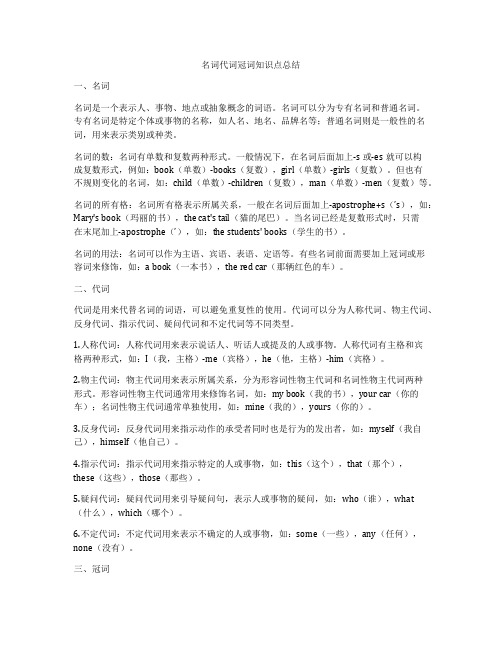
名词代词冠词知识点总结一、名词名词是一个表示人、事物、地点或抽象概念的词语。
名词可以分为专有名词和普通名词。
专有名词是特定个体或事物的名称,如人名、地名、品牌名等;普通名词则是一般性的名词,用来表示类别或种类。
名词的数:名词有单数和复数两种形式。
一般情况下,在名词后面加上-s或-es就可以构成复数形式,例如:book(单数)-books(复数),girl(单数)-girls(复数)。
但也有不规则变化的名词,如:child(单数)-children(复数),man(单数)-men(复数)等。
名词的所有格:名词所有格表示所属关系,一般在名词后面加上-apostrophe+s(’s),如:Mary's book(玛丽的书),the cat's tail(猫的尾巴)。
当名词已经是复数形式时,只需在末尾加上-apostrophe(’),如:the students' books(学生的书)。
名词的用法:名词可以作为主语、宾语、表语、定语等。
有些名词前面需要加上冠词或形容词来修饰,如:a book(一本书),the red car(那辆红色的车)。
二、代词代词是用来代替名词的词语,可以避免重复性的使用。
代词可以分为人称代词、物主代词、反身代词、指示代词、疑问代词和不定代词等不同类型。
1.人称代词:人称代词用来表示说话人、听话人或提及的人或事物。
人称代词有主格和宾格两种形式,如:I(我,主格)-me(宾格),he(他,主格)-him(宾格)。
2.物主代词:物主代词用来表示所属关系,分为形容词性物主代词和名词性物主代词两种形式。
形容词性物主代词通常用来修饰名词,如:my book(我的书),your car(你的车);名词性物主代词通常单独使用,如:mine(我的),yours(你的)。
3.反身代词:反身代词用来指示动作的承受者同时也是行为的发出者,如:myself(我自己),himself(他自己)。
英语名词,冠词,代词分类总结
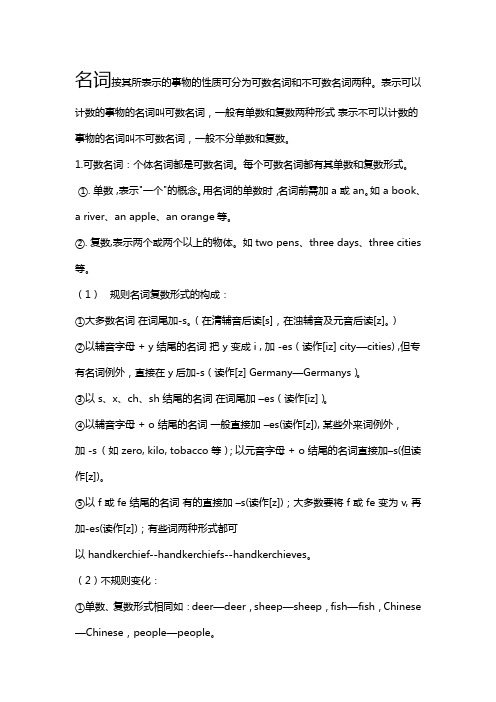
名词按其所表示的事物的性质可分为可数名词和不可数名词两种。
表示可以计数的事物的名词叫可数名词,一般有单数和复数两种形式表示不可以计数的事物的名词叫不可数名词,一般不分单数和复数。
1.可数名词:个体名词都是可数名词。
每个可数名词都有其单数和复数形式。
①. 单数 ,表示"一个"的概念。
用名词的单数时,名词前需加 a 或 an。
如 a book、a river、an apple、an orange等。
②. 复数,表示两个或两个以上的物体。
如two pens、three days、three cities 等。
(1)规则名词复数形式的构成:①大多数名词在词尾加-s。
(在清辅音后读[s],在浊辅音及元音后读[z]。
)②以辅音字母 + y 结尾的名词把 y 变成 i , 加 -es(读作[iz] city—cities) ,但专有名词例外,直接在 y后加-s(读作[z] Germany—Germanys)。
③以 s、x、ch、sh 结尾的名词在词尾加–es(读作[iz])。
④以辅音字母 + o 结尾的名词一般直接加–es(读作[z]), 某些外来词例外,加 -s (如 zero, kilo, tobacco 等);以元音字母 + o 结尾的名词直接加–s(但读作[z])。
⑤以 f 或 fe 结尾的名词有的直接加–s(读作[z]);大多数要将 f 或 fe 变为 v, 再加-es(读作[z]);有些词两种形式都可以 handkerchief--handkerchiefs--handkerchieves。
(2)不规则变化:①单数、复数形式相同如:deer—deer,sheep—sheep,fish—fish,Chinese —Chinese,people—people。
②改变单数名词中的元音字母如:foot—feet,man—men ,tooth—teeth,woman—women。
③含有man,woman的复合名词的变化如: Frenchwoman—Frenchwomem,fisherman—fishermen.④其他变化如:child—children ,mouse—mice。
英语之中名词、代词、动词、形容词、冠词、数词、副词、介词、连词、感叹词
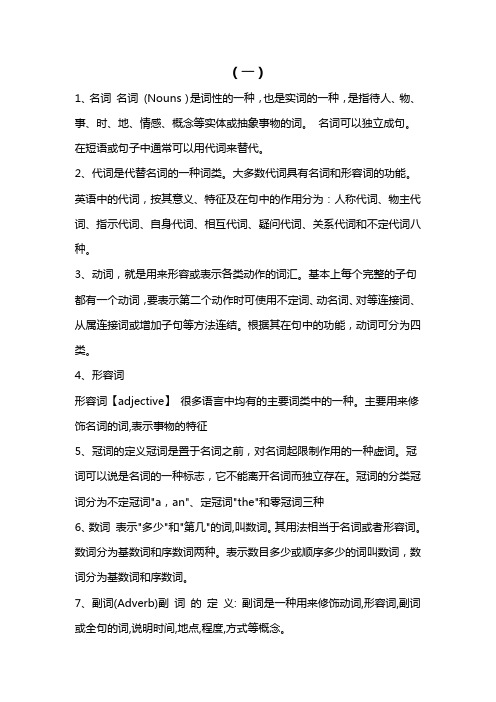
(一)1、名词名词(Nouns)是词性的一种,也是实词的一种,是指待人、物、事、时、地、情感、概念等实体或抽象事物的词。
名词可以独立成句。
在短语或句子中通常可以用代词来替代。
2、代词是代替名词的一种词类。
大多数代词具有名词和形容词的功能。
英语中的代词,按其意义、特征及在句中的作用分为:人称代词、物主代词、指示代词、自身代词、相互代词、疑问代词、关系代词和不定代词八种。
3、动词,就是用来形容或表示各类动作的词汇。
基本上每个完整的子句都有一个动词,要表示第二个动作时可使用不定词、动名词、对等连接词、从属连接词或增加子句等方法连结。
根据其在句中的功能,动词可分为四类。
4、形容词形容词【adjective】很多语言中均有的主要词类中的一种。
主要用来修饰名词的词,表示事物的特征5、冠词的定义冠词是置于名词之前,对名词起限制作用的一种虚词。
冠词可以说是名词的一种标志,它不能离开名词而独立存在。
冠词的分类冠词分为不定冠词"a,an"、定冠词"the"和零冠词三种6、数词表示"多少"和"第几"的词,叫数词。
其用法相当于名词或者形容词。
数词分为基数词和序数词两种。
表示数目多少或顺序多少的词叫数词,数词分为基数词和序数词。
7、副词(Adverb)副词的定义: 副词是一种用来修饰动词,形容词,副词或全句的词,说明时间,地点,程度,方式等概念。
8、介词的定义和特征介词是一种用来表示词与词, 词与句之间的关系的词。
在句中不能单独作句字成分。
介词后面一般有名词代词或相当于名词的其他词类,短语或从句作它的宾语。
(二)1、名词,人或事物的名称3、代词,代替名词或者数词(比如some就是代替数目)3、动词,动作或状态4、数词,表示数目或顺序(比如序数词,5th就是表示顺序)5、形容词,人或事物的性质或状态(因为形容词一般修饰名词)6、副词,动作的特征或性状特征(因为副词一般修饰动词或形容词)7、冠词,表示名词的泛指或特指8、介词,表示名词或代词与其他词的关系(因为介词后面一半紧跟名词,代词或其他名词性结构)9、连词,连接词与词,短语与短语,句子与句子10、感叹词,表示说话时的感情或语气(三)1、adj. / a. 形容词用来描述一类物质的性质,状态,外貌,或人的性格特点,性质,品格如:big,happy2、adv. / ad. 副词用来修饰动作或形容词,一般在句子中做状语用表示动作的进行怎样,或表示程度,特点,如:clearly,happily3、prep. 介词连接地点,时间的一类词语,可以表示方位,时间.跟一些表示时间,地点的词连用表示介词词组如:in,to,on,under4、conj. 连词用来连接时间,地点,原因,结果的一类词语如:when,beacuse,so5、num. 数词表示数字的词,既可以是基数词,也可以是序数词如:one,two,first6、int. 感叹词表示感叹的一类词,一般不加一解释,只代表感叹如:what,how,haurray7、vt. 及物动词(后面要加宾语)行为动作的词如:do,finish,play8、vi. 不及物动词(后面不加宾语)表示行为动作的词如:appear9、n. 名词表示物体,物质的词如:pig,cow,man10、pron. 代词代指一类人,事或物的词如:he,she,hers,his,things11、art = 冠词,article的缩写(四)在英语语法中主要把词分为8大类:1.名词:表示人、物或地方等,如:John,teacher;table,pen;London;beauty.2.代词:用来代替名词,以避免重复某个名词,如:I,you,it,that,those,them.3.形容词:用来修饰或限制某个(些)名词,如:good(man),white (paper),every(book),much(water),(John is)hon-est,(He seems)lazy.被修饰或限制的名词,叫做主体词(head-word)。
英语之中名词、代词、动词、形容词、冠词、数词、副词、介词、连词、感叹词
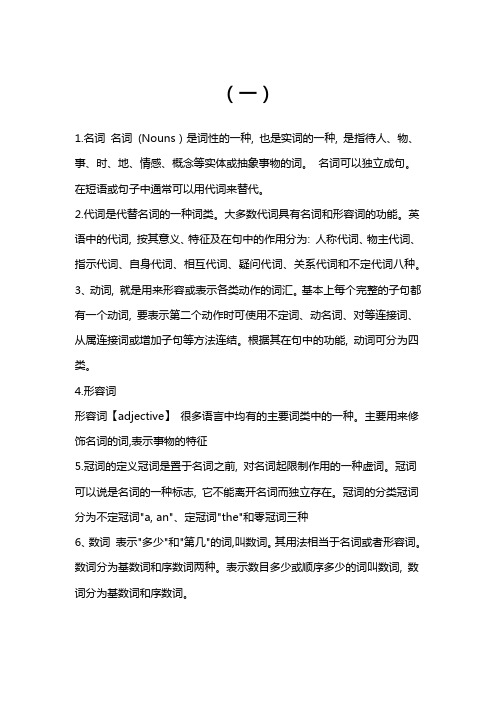
(一)1.名词名词(Nouns)是词性的一种, 也是实词的一种, 是指待人、物、事、时、地、情感、概念等实体或抽象事物的词。
名词可以独立成句。
在短语或句子中通常可以用代词来替代。
2.代词是代替名词的一种词类。
大多数代词具有名词和形容词的功能。
英语中的代词, 按其意义、特征及在句中的作用分为: 人称代词、物主代词、指示代词、自身代词、相互代词、疑问代词、关系代词和不定代词八种。
3、动词, 就是用来形容或表示各类动作的词汇。
基本上每个完整的子句都有一个动词, 要表示第二个动作时可使用不定词、动名词、对等连接词、从属连接词或增加子句等方法连结。
根据其在句中的功能, 动词可分为四类。
4.形容词形容词【adjective】很多语言中均有的主要词类中的一种。
主要用来修饰名词的词,表示事物的特征5.冠词的定义冠词是置于名词之前, 对名词起限制作用的一种虚词。
冠词可以说是名词的一种标志, 它不能离开名词而独立存在。
冠词的分类冠词分为不定冠词"a, an"、定冠词"the"和零冠词三种6、数词表示"多少"和"第几"的词,叫数词。
其用法相当于名词或者形容词。
数词分为基数词和序数词两种。
表示数目多少或顺序多少的词叫数词, 数词分为基数词和序数词。
7、副词(Adverb)副词的定义: 副词是一种用来修饰动词,形容词,副词或全句的词,说明时间,地点,程度,方式等概念。
8、介词的定义和特征介词是一种用来表示词与词, 词与句之间的关系的词。
在句中不能单独作句字成分。
介词后面一般有名词代词或相当于名词的其他词类, 短语或从句作它的宾语。
(二)1.名词, 人或事物的名称3.代词, 代替名词或者数词(比如some就是代替数目)3.动词, 动作或状态4.数词, 表示数目或顺序(比如序数词, 5th就是表示顺序)5.形容词, 人或事物的性质或状态(因为形容词一般修饰名词)6.副词, 动作的特征或性状特征(因为副词一般修饰动词或形容词)7、冠词, 表示名词的泛指或特指8、介词, 表示名词或代词与其他词的关系(因为介词后面一半紧跟名词, 代词或其他名词性结构)9、连词, 连接词与词, 短语与短语, 句子与句子10、感叹词, 表示说话时的感情或语气(三)1.adj./ a.形容词用来描述一类物质的性质,状态,外貌,或人的性格特点,性质,品格如:big,happy2.adv./ ad.副词用来修饰动作或形容词,一般在句子中做状语用表示动作的进行怎样,或表示程度,特点,如:clearly,happily3.prep.介词连接地点,时间的一类词语,可以表示方位,时间.跟一些表示时间,地点的词连用表示介词词组如:in,to,on,under4.conj.连词用来连接时间,地点,原因,结果的一类词语如:when,beacuse,so5.num.数词表示数字的词,既可以是基数词,也可以是序数词如:one,two,first6.int.感叹词表示感叹的一类词,一般不加一解释,只代表感叹如:what,how,haurray7、vt.及物动词(后面要加宾语)行为动作的词如:do,finish,play8、vi.不及物动词(后面不加宾语)表示行为动作的词如:appear9、n.名词表示物体,物质的词如:pig,cow,man10、pron.代词代指一类人,事或物的词如:he,she,hers,his,things11.art = 冠词, article的缩写(四)在英语语法中主要把词分为8大类:1. 名词: 表示人、物或地方等, 如: John, teacher;table, pen;London;beauty.2. 代词: 用来代替名词, 以避免重复某个名词, 如: I, you, it, that, those, them.3.形容词:用来修饰或限制某个(些)名词, 如:good(man), white (paper), every(book), much(water), (John is)hon-est, (He seems)lazy.被修饰或限制的名词, 叫做主体词(head-word)。
英语之中名词、代词、动词、形容词、冠词、数词、副词、介词、连词、感叹词讲课讲稿
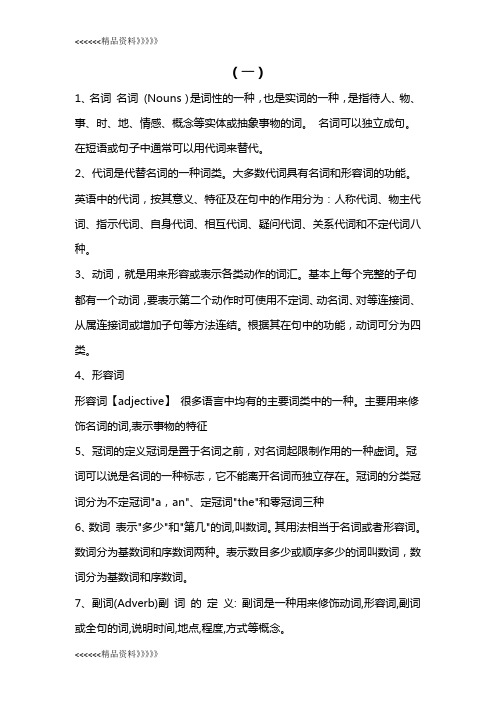
(一)1、名词名词(Nouns)是词性的一种,也是实词的一种,是指待人、物、事、时、地、情感、概念等实体或抽象事物的词。
名词可以独立成句。
在短语或句子中通常可以用代词来替代。
2、代词是代替名词的一种词类。
大多数代词具有名词和形容词的功能。
英语中的代词,按其意义、特征及在句中的作用分为:人称代词、物主代词、指示代词、自身代词、相互代词、疑问代词、关系代词和不定代词八种。
3、动词,就是用来形容或表示各类动作的词汇。
基本上每个完整的子句都有一个动词,要表示第二个动作时可使用不定词、动名词、对等连接词、从属连接词或增加子句等方法连结。
根据其在句中的功能,动词可分为四类。
4、形容词形容词【adjective】很多语言中均有的主要词类中的一种。
主要用来修饰名词的词,表示事物的特征5、冠词的定义冠词是置于名词之前,对名词起限制作用的一种虚词。
冠词可以说是名词的一种标志,它不能离开名词而独立存在。
冠词的分类冠词分为不定冠词"a,an"、定冠词"the"和零冠词三种6、数词表示"多少"和"第几"的词,叫数词。
其用法相当于名词或者形容词。
数词分为基数词和序数词两种。
表示数目多少或顺序多少的词叫数词,数词分为基数词和序数词。
7、副词(Adverb)副词的定义: 副词是一种用来修饰动词,形容词,副词或全句的词,说明时间,地点,程度,方式等概念。
8、介词的定义和特征介词是一种用来表示词与词, 词与句之间的关系的词。
在句中不能单独作句字成分。
介词后面一般有名词代词或相当于名词的其他词类,短语或从句作它的宾语。
(二)1、名词,人或事物的名称3、代词,代替名词或者数词(比如some就是代替数目)3、动词,动作或状态4、数词,表示数目或顺序(比如序数词,5th就是表示顺序)5、形容词,人或事物的性质或状态(因为形容词一般修饰名词)6、副词,动作的特征或性状特征(因为副词一般修饰动词或形容词)7、冠词,表示名词的泛指或特指8、介词,表示名词或代词与其他词的关系(因为介词后面一半紧跟名词,代词或其他名词性结构)9、连词,连接词与词,短语与短语,句子与句子10、感叹词,表示说话时的感情或语气(三)1、adj. / a. 形容词用来描述一类物质的性质,状态,外貌,或人的性格特点,性质,品格如:big,happy2、adv. / ad. 副词用来修饰动作或形容词,一般在句子中做状语用表示动作的进行怎样,或表示程度,特点,如:clearly,happily3、prep. 介词连接地点,时间的一类词语,可以表示方位,时间.跟一些表示时间,地点的词连用表示介词词组如:in,to,on,under4、conj. 连词用来连接时间,地点,原因,结果的一类词语如:when,beacuse,so5、num. 数词表示数字的词,既可以是基数词,也可以是序数词如:one,two,first6、int. 感叹词表示感叹的一类词,一般不加一解释,只代表感叹如:what,how,haurray7、vt. 及物动词(后面要加宾语)行为动作的词如:do,finish,play8、vi. 不及物动词(后面不加宾语)表示行为动作的词如:appear9、n. 名词表示物体,物质的词如:pig,cow,man10、pron. 代词代指一类人,事或物的词如:he,she,hers,his,things11、art = 冠词,article的缩写(四)在英语语法中主要把词分为8大类:1.名词:表示人、物或地方等,如:John,teacher;table,pen;London;beauty.2.代词:用来代替名词,以避免重复某个名词,如:I,you,it,that,those,them.3.形容词:用来修饰或限制某个(些)名词,如:good(man),white (paper),every(book),much(water),(John is)hon-est,(He seems)lazy.被修饰或限制的名词,叫做主体词(head-word)。
名词、代词和冠词的用法总结
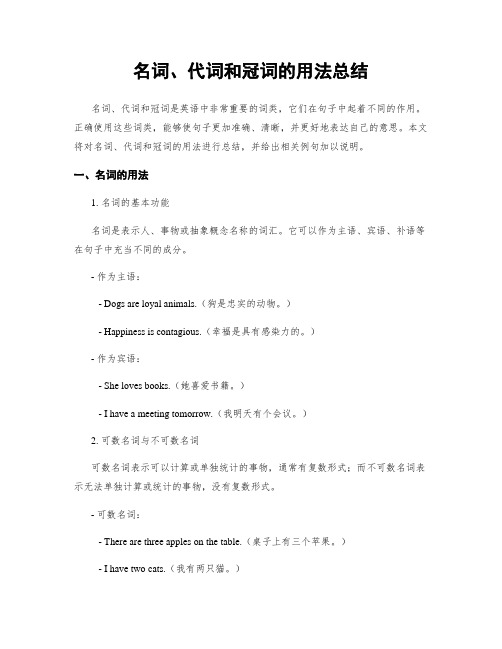
名词、代词和冠词的用法总结名词、代词和冠词是英语中非常重要的词类,它们在句子中起着不同的作用。
正确使用这些词类,能够使句子更加准确、清晰,并更好地表达自己的意思。
本文将对名词、代词和冠词的用法进行总结,并给出相关例句加以说明。
一、名词的用法1. 名词的基本功能名词是表示人、事物或抽象概念名称的词汇。
它可以作为主语、宾语、补语等在句子中充当不同的成分。
- 作为主语:- Dogs are loyal animals.(狗是忠实的动物。
)- Happiness is contagious.(幸福是具有感染力的。
)- 作为宾语:- She loves books.(她喜爱书籍。
)- I have a meeting tomorrow.(我明天有个会议。
)2. 可数名词与不可数名词可数名词表示可以计算或单独统计的事物,通常有复数形式;而不可数名词表示无法单独计算或统计的事物,没有复数形式。
- 可数名词:- There are three apples on the table.(桌子上有三个苹果。
)- I have two cats.(我有两只猫。
)- 不可数名词:- I need some water.(我需要一些水。
)- He has a lot of experience.(他有很多经验。
)3. 连用的名词有些名词可以连在一起形成一个整体,称为连用的名词。
- 作为复合名词:- The basketball game was exciting.(篮球比赛很精彩。
)- She has a part-time job.(她有一份兼职工作。
)- 作为领属关系的名词短语:- My mother's car is red.(我妈妈的车是红色的。
)- The president's speech was inspiring.(总统的演讲令人鼓舞。
)二、代词的用法1. 代词的基本功能代词用来代替名词,以减少对相同名称重复使用。
冠词-名词-代词
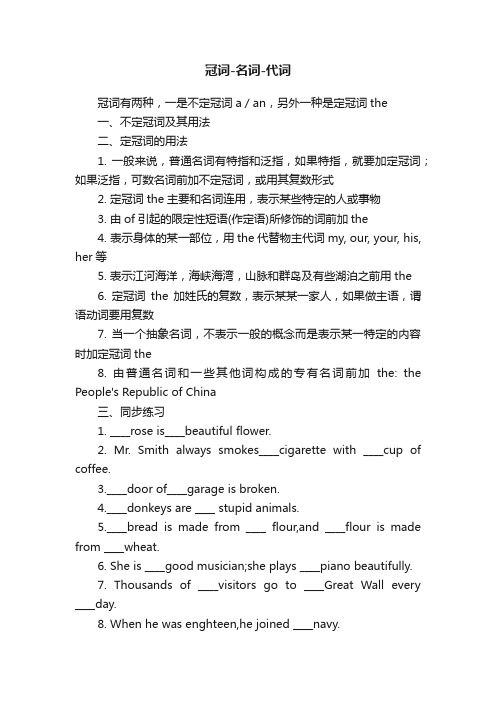
冠词-名词-代词冠词有两种,一是不定冠词a/an,另外一种是定冠词the一、不定冠词及其用法二、定冠词的用法1. 一般来说,普通名词有特指和泛指,如果特指,就要加定冠词;如果泛指,可数名词前加不定冠词,或用其复数形式2. 定冠词the主要和名词连用,表示某些特定的人或事物3. 由of引起的限定性短语(作定语)所修饰的词前加the4. 表示身体的某一部位,用the代替物主代词my, our, your, his, her等5. 表示江河海洋,海峡海湾,山脉和群岛及有些湖泊之前用the6. 定冠词the加姓氏的复数,表示某某一家人,如果做主语,谓语动词要用复数7. 当一个抽象名词,不表示一般的概念而是表示某一特定的内容时加定冠词the8. 由普通名词和一些其他词构成的专有名词前加the: the People's Republic of China三、同步练习1. ____rose is____beautiful flower.2. Mr. Smith always smokes____cigarette with ____cup of coffee.3.____door of____garage is broken.4.____donkeys are ____ stupid animals.5.____bread is made from ____ flour,and ____flour is made from ____wheat.6. She is ____good musician;she plays ____piano beautifully.7. Thousands of ____visitors go to ____Great Wall every ____day.8. When he was enghteen,he joined ____navy.9. He sent me ____letter and ____postcard;____letter didn't arrive.10. Li is not at ____office;I think he's gone____home.11. Is there ____telephone here?12. She is studying ____English and ____French.13. I bought ____pen and some paper,but I left____pen in ____shop.14. ____machine is made of ____steel and ____copper.15. ____honesty is ____best policy.16. ____coal is 60 dollars ____ton at the moment.17. I stay at ____home last night and listened to ____radio.18. We went to Paris and saw ____Palace of Versailles.19. He goes back to ____ country to see his people once ____year.20. ____Liu's are going to ____cinema.语法系列复习专题-----名词1. 名词的分类专有名词:指某人,某地,某机构等专有的名称,其首字母要大写。
英语之中名词、代词、动词、形容词、冠词、数词、副词、介词、连词、感叹词.doc

(一)1、名词名词 (Nouns )是词性的一种,也是实词的一种,是指待人、物、事、时、地、情感、概念等实体或抽象事物的词。
名词可以独立成句。
在短语或句子中通常可以用代词来替代。
2、代词是代替名词的一种词类。
大多数代词具有名词和形容词的功能。
英语中的代词,按其意义、特征及在句中的作用分为:人称代词、物主代词、指示代词、自身代词、相互代词、疑问代词、关系代词和不定代词八种。
3、动词,就是用来形容或表示各类动作的词汇。
基本上每个完整的子句都有一个动词,要表示第二个动作时可使用不定词、动名词、对等连接词、从属连接词或增加子句等方法连结。
根据其在句中的功能,动词可分为四类。
4、形容词形容词【 adjective】很多语言中均有的主要词类中的一种。
主要用来修饰名词的词 , 表示事物的特征5、冠词的定义冠词是置于名词之前,对名词起限制作用的一种虚词。
冠词可以说是名词的一种标志,它不能离开名词而独立存在。
冠词的分类冠词分为不定冠词"a ,an" 、定冠词 "the" 和零冠词三种6、数词表示 " 多少 " 和" 第几 " 的词 , 叫数词。
其用法相当于名词或者形容词。
数词分为基数词和序数词两种。
表示数目多少或顺序多少的词叫数词,数词分为基数词和序数词。
7、副词 (Adverb) 副词的定义: 副词是一种用来修饰动词 , 形容词 , 副词或全句的词 , 说明时间 , 地点 , 程度 , 方式等概念。
8、介词的定义和特征介词是一种用来表示词与词, 词与句之间的关系的词。
在句中不能单独作句字成分。
介词后面一般有名词代词或相当于名词的其他词类,短语或从句作它的宾语。
(二)1、名词,人或事物的名称3、代词,代替名词或者数词(比如some就是代替数目)3、动词,动作或状态4、数词,表示数目或顺序(比如序数词,5th就是表示顺序)5、形容词,人或事物的性质或状态(因为形容词一般修饰名词)6、副词,动作的特征或性状特征(因为副词一般修饰动词或形容词)7、冠词,表示名词的泛指或特指8、介词,表示名词或代词与其他词的关系(因为介词后面一半紧跟名词,代词或其他名词性结构)9、连词,连接词与词,短语与短语,句子与句子10、感叹词,表示说话时的感情或语气(三)1、adj. / a.形容词用来描述一类物质的性质, 状态 , 外貌 ,或人的性格特点 , 性质 , 品格如:big,happy2、adv. / ad.副词用来修饰动作或形容词, 一般在句子中做状语用表示动作的进行怎样 , 或表示程度 , 特点 ,如:clearly,happily3、prep.介词连接地点 , 时间的一类词语 , 可以表示方位 , 时间 . 跟一些表示时间, 地点的词连用表示介词词组如:in,to,on,under4、conj.连词用来连接时间 , 地点 , 原因, 结果的一类词语如:when,beacuse,so5、num. 数词表示数字的词 , 既可以是基数词 , 也可以是序数词如:one,two,first6、int.感叹词表示感叹的一类词 , 一般不加一解释 , 只代表感叹如:what,how,haurray7、vt.及物动词(后面要加宾语)行为动作的词如:do,finish,play8、vi.不及物动词(后面不加宾语)表示行为动作的词如:appear9、n. 名词表示物体 , 物质的词如:pig,cow,man10、pron.代词代指一类人 , 事或物的词如:he,she,hers,his,things11、art =冠词,article的缩写(四)在英语语法中主要把词分为8 大类:1.名词:表示人、物或地方等,如:John,teacher ;table ,pen;London;beauty .2.代词:用来代替名词,以避免重复某个名词,如: I ,you,it ,that ,those ,them.3.形容词:用来修饰或限制某个(些)名词,如: good(man),white (paper ),every(book),much(water ),(John is )hon-est ,(He seems)lazy .被修饰或限制的名词,叫做主体词(head-word)。
英语之中名词、代词、动词、形容词、冠词、数词、副词、介词、连词、感叹词
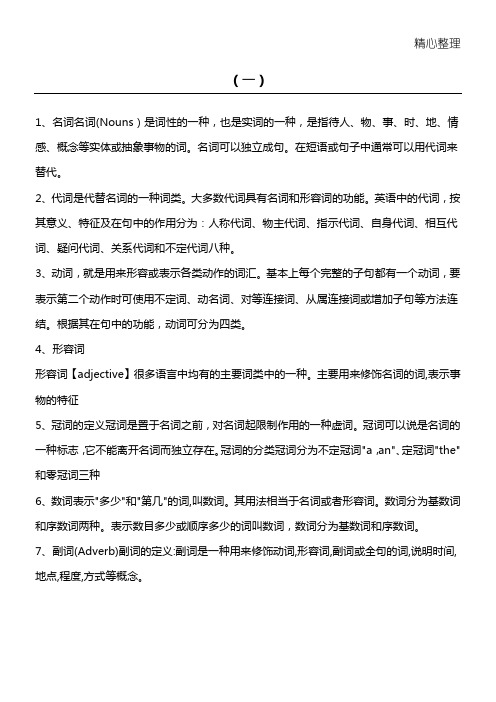
Johnistrulyhonest.约翰的确很诚实。
Hearrivedtoolate.他到得太晚了。
Hewalkedratherslowly.他走得相当慢。
Hesatfarbehindme.他坐在我后面挺远的地方。
Hearrivedexactlyatseven.他在7点整到达。
名词,代词或其他名词性结构)
9、连词,连接词与词,短语与短语,句子与句子
10、感叹词,表示说话时的感情或语气
(三)
1、adj./a.形容词
用来描述一类物质的性质,状态,外貌,
或人的性格特点,性质,品格
如:big,happy
2、adv./ad.副词
用来修饰动作或形容词,一般在句子中做状语用
表示动作的进行怎样,或表示程度,特点,
7、副词(Adverb)副词的定义:副词是一种用来修饰动词,形容词,副词或全句的词,说明时间,地点,程度,方式等概念。
8、介词的定义和特征介词是一种用来表示词与词,词与句之间的关系的词。在句中不能单独作句字成分。介词后面一般有名词代词或相当于名词的其他词类,短语或从句作它的宾语。
(二)
1、名词,人或事物的名称
Hewillcomeprobablyafterwetakelunch.他可能在我们吃午饭之后到达。
Helovesherjustbecausesheispretty.他爱她只是因为她漂亮。
Luckily,hegotbackhismoney.幸好他把钱要回来了。
Historically,Chinaisagreatnation.从历史上看中国是个伟大的国家。
4.动词:表示行为或状态,如:speak,read,go,think,is,seem.
高考英语语法考情分析7:名词、冠词和代词
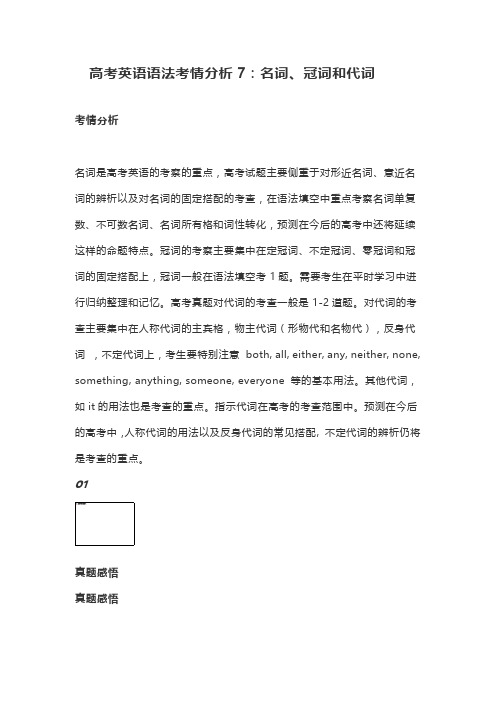
高考英语语法考情分析7:名词、冠词和代词考情分析名词是高考英语的考察的重点,高考试题主要侧重于对形近名词、意近名词的辨析以及对名词的固定搭配的考查,在语法填空中重点考察名词单复数、不可数名词、名词所有格和词性转化,预测在今后的高考中还将延续这样的命题特点。
冠词的考察主要集中在定冠词、不定冠词、零冠词和冠词的固定搭配上,冠词一般在语法填空考1题。
需要考生在平时学习中进行归纳整理和记忆。
高考真题对代词的考查一般是1-2道题。
对代词的考查主要集中在人称代词的主宾格,物主代词(形物代和名物代),反身代词,不定代词上,考生要特别注意both, all, either, any, neither, none, something, anything, someone, everyone 等的基本用法。
其他代词,如it的用法也是考查的重点。
指示代词在高考的考查范围中。
预测在今后的高考中,人称代词的用法以及反身代词的常见搭配, 不定代词的辨析仍将是考查的重点。
01真题感悟真题感悟1.(2021年全国乙卷·69) ________(activity) there range from whale watching to hiking (远足) and accommodations aim to have a low impact on the natural environment.答案:Activities解析:考查名词复数。
空格中所填单词在句中作主语,由句中from whale watching to hiking可知,这里指各种各样的活动,需用activity的复数形式。
2.(2021年八省联考·65) A________ (student) college experience is his or her own, and the student must put his or her education first.答案:student’s解析:考查名词所有格。
英语之中名词、代词、动词、形容词、冠词、数词、副词、介词、连词、感叹词

5.介词:表示它后面的名词(或代词)跟它前面的动词、另一名词或形容词的关系。这些名词(或代词)称为介词的宾语。
介词宾语和介词构成介词短语。
Hewenttoschool.(介词to把名词school和动词went联系起来)
Heisaverykindman.他是一个非常善良的人。
Johnistrulyhonest.约翰的确很诚实。
Hearrivedtoolate.他到得太晚了。
Hewalkedratherslowly.他走得相当慢。
Hesatfarbehindme.他坐在我后面挺远的地方。
Hearrivedexactlyatseven.他在7点整到达。
Sheisprettybutcruel.她很漂亮却很残忍。
Hedoesexerciseinclassorathome.他在课堂上或是在家里做练习。(or把inclass和athome两个短语连接起来)
Shesatbyme,readingnovelsbutturninghereyestochildrenaboutherfromtimetotime.她坐在我身旁看小说,但不时把眼睛转向她周围的孩子们。
2.代词:用来代替名词,以避免重复某个名词,如:I,you,it,that,those,them.
3.形容词:用来修饰或限制某个(些)名词,如:good(man),white(paper),every(book),much(water),(Johnis)hon-est,(Heseems)lazy.被修饰或限制的名词,叫做主体词(head-word)。
5、冠词的定义冠词是置于名词之前,对名词起限制作用的一种虚词。冠词可以说是名词的一种标志,它不能离开名词而独立存在。冠词的分类冠词分为不定冠词"a,an"、定冠词"the"和零冠词三种
英语之中名词、代词、动词、形容词、冠词、数词、副词、介词、连词、感叹词

英语之中名词、代词、动词、形容词、冠词、数词、副词、介词、连词、感叹词副词用来修饰动词、形容词或其他副词,表示时间、地点、方式、程度等概念。
如: slowly。
here3、___名词表示人、物、地点、时间、情感、概念等实体或抽象事物的词汇。
可独立成句,通常可以用代词替代。
如: book。
love4、___代词代替名词或数词的一种词类,具有名词和形容词的功能。
包括人称代词、物主代词、指示代词、自身代词、相互代词、疑问代词、关系代词和不定代词。
如: he。
their。
this5、v。
/ verb动词用来表示动作或状态的词汇,每个完整的子句都要有一个动词。
可使用不定词、动名词、对等连接词、从属连接词或增加子句等方法连结。
如: run。
think6、___数词表示数目或顺序的词汇,可用作名词或形容词。
分为基数词和序数词两种。
如: three。
fifth7、art。
/ article冠词置于名词前起限制作用的一种虚词,分为不定冠词"a,an"、定冠词"the"和零冠词。
如: a book。
the sky8、___介词用来表示词与词、词与句之间的关系的词汇,不能单独作句子成分。
后面一般有名词代词或相当于名词的其他词类、短语或从句作宾语。
如: in。
with9、___连词用来连接词与词、短语与短语、句子与句子的词汇。
如: and。
but10、int。
/ n感叹词表示说话时的感情或语气的词汇。
如: wow。
oh___ for you。
He is upset with Mary。
Adverbs modify or limit verbs。
adjectives。
other adverbs。
and even ns。
ns。
___ the task with great care。
He is an ___ kind individual。
John is ___ at seven o'clock。
第1讲词法——名词、冠词、代词

词法——名词、冠词、代词北京代词、介词、连词、疑问代词和疑问副词、形容词比较级和最高级、情态动词、非谓语动词、时态语态、宾语从句、状语从句、there be句型、主谓一致天津名词词义辨析、冠词、代词、动词词义或词组辨析、情态动词基本用法、非谓语动词、比较级、副词词义用法辨析、介词及介词词组、连词、数词、宾语从句、定语从句关系代词、时态语态、主谓一致、交际用语上海冠词、介词、代词、名词词义辨析、形容词副词词义及用法辨析、形容词比较级、连词、情态动词、时态语态、非谓语动词、表建议句型、反义疑问句、there be句型、疑问代词和疑问副词、宾语从句、动词及动词词组辨析、主谓一致、定语从句、交际用语、感叹句广州代词、连词、名词、形容词副词比较级、数词、非谓语动词、情态动词、时态语态、宾语从句、定语从句关系词、提建议句型、反义疑问句、主谓一致成都冠词、数词、代词、连词、介词、情态动词、疑问代词和疑问副词、形容词比较级、副词用法辨析、动词及动词词组辨析、非谓语动词、时态语态、宾语从句、定语从句、反义疑问句、虚拟语气第一讲:词法——名词、冠词、代词第二讲:词法——介词、形容词副词、数词第三讲:词法——动词、非谓语动词、连词第四讲:句法——简单句、祈使句、感叹句、there be第五讲:句法——反义疑问句、定语从句、宾语从句第六讲:句法——主谓一致、时态语态第七讲:状语从句、虚拟语气1.For my homework I have to write a(n)____about the wonders of the world. (天津2011 , 31) A.music B.picture C.composition D.exam2.If you work hard, you’ll get good _________. (天津2010,31)A.grades B.notes C.lessons D.answers 3.The old man used to raise many ______ to make a living on the farm. (上海2011 , 34) A.duck B.bird C.horse D.sheep 4.Could you take ____ for these ____? They are very beautiful . (广州2009,27) A.any photos, tomatoes B.some photos, tomatoesC.some photos, tomatos D.any photos, tomatoes一、定冠词the特指双方熟悉,上文已经提及;世上独一无二,方位名词乐器;某些专有名词,外加复数姓氏;序数词最高级,习惯用语牢记。
英语语法知识:名词、代词和冠词
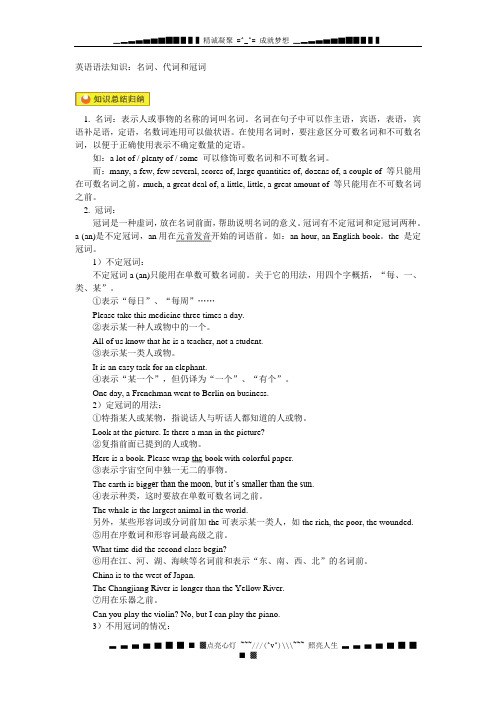
英语语法知识:名词、代词和冠词1. 名词:表示人或事物的名称的词叫名词。
名词在句子中可以作主语,宾语,表语,宾语补足语,定语,名数词连用可以做状语。
在使用名词时,要注意区分可数名词和不可数名词,以便于正确使用表示不确定数量的定语。
如:a lot of / plenty of / some 可以修饰可数名词和不可数名词。
而:many, a few, few several, scores of, large quantities of, dozens of, a couple of 等只能用在可数名词之前,much, a great deal of, a little, little, a great amount of 等只能用在不可数名词之前。
2. 冠词:冠词是一种虚词,放在名词前面,帮助说明名词的意义。
冠词有不定冠词和定冠词两种。
a (an)是不定冠词,an用在元音发音开始的词语前。
如:an hour, an English book。
the 是定冠词。
1)不定冠词:不定冠词a (an)只能用在单数可数名词前。
关于它的用法,用四个字概括,“每、一、类、某”。
①表示“每日”、“每周”……Please take this medicine three times a day.②表示某一种人或物中的一个。
All of us know that he is a teacher, not a student.③表示某一类人或物。
It is an easy task for an elephant.④表示“某一个”,但仍译为“一个”、“有个”。
One day, a Frenchman went to Berlin on business.2)定冠词的用法:①特指某人或某物,指说话人与听话人都知道的人或物。
Look at the picture. Is there a man in the picture?②复指前面已提到的人或物。
- 1、下载文档前请自行甄别文档内容的完整性,平台不提供额外的编辑、内容补充、找答案等附加服务。
- 2、"仅部分预览"的文档,不可在线预览部分如存在完整性等问题,可反馈申请退款(可完整预览的文档不适用该条件!)。
- 3、如文档侵犯您的权益,请联系客服反馈,我们会尽快为您处理(人工客服工作时间:9:00-18:30)。
冠词有两种,一是不定冠词a/an,另外一种是定冠词the
一、不定冠词及其用法
二、定冠词的用法
1. 一般来说,普通名词有特指和泛指,如果特指,就要加定冠词;如果泛指,可数名词前加不定冠词,或用其复数形式
2. 定冠词the主要和名词连用,表示某些特定的人或事物
3. 由of引起的限定性短语(作定语)所修饰的词前加the
4. 表示身体的某一部位,用the代替物主代词my, our, your, his, her等
5. 表示江河海洋,海峡海湾,山脉和群岛及有些湖泊之前用the
6. 定冠词the加姓氏的复数,表示某某一家人,如果做主语,谓语动词要用复数
7. 当一个抽象名词,不表示一般的概念而是表示某一特定的内容时加定冠词the
8. 由普通名词和一些其他词构成的专有名词前加the: the People's Republic of China
三、同步练习
1. ____rose is____beautiful flower.
2. Mr. Smith always smokes____cigarette with ____cup of coffee.
3.____door of____garage is broken.
4.____donkeys are ____ stupid animals.
5.____bread is made from ____ flour,and ____flour is made from ____wheat.
6. She is ____good musician;she plays ____piano beautifully.
7. Thousands of ____visitors go to ____Great Wall every ____day.
8. When he was enghteen,he joined ____navy.
9. He sent me ____letter and ____postcard;____letter didn't arrive.
10. Li is not at ____office;I think he's gone____home.
11. Is there ____telephone here?
12. She is studying ____English and ____French.
13. I bought ____pen and some paper,but I left____pen in ____shop.
14. ____machine is made of ____steel and ____copper.
15. ____honesty is ____best policy.
16. ____coal is 60 dollars ____ton at the moment.
17. I stay at ____home last night and listened to ____radio.
18. We went to Paris and saw ____Palace of Versailles.
19. He goes back to ____ country to see his people once ____year.
20. ____Liu's are going to ____cinema.
语法系列复习专题-----名词
1. 名词的分类
专有名词:指某人,某地,某机构等专有的名称,其首字母要大写。
如HongKong, China, Bill Clinton, Red Cross
个体名词:表示某类人或东西中的个体,如student, book
可数名词
集体名词:表示若干个体组成的集合体,如:family, school, group, people
不可数名词
物质名词:表示无法分为个体的实物,如:cotton, air, tea
抽象名词:表示抽象概念,work,happiness, news
注:不可数名词可以与表示量的可数名词连用,借以表示“可数”的概念,我们可以加a(n) piece [sheet(张), suit(套), tube(管), packet(包), item(条,则), bar(条), basket(篮子), glass(杯),bunch(束), pair(双,对), bowl(碗), portion(份), herd(群), series(系列), shower(阵) etc. ],如:a piece of advice(一条建议) /a basket of fruit(一篮水果) /an item of information (一则信息)/a kind of protection(一种保护)等。
2.名词的复数
1)绝大多数在词尾加s。
如:book,books; bag,bags; cup,cups; face,faces.
2)以ch, sh, s, x, o结尾的名词加es。
如:watch,watches;brush,brushes;hero,heroes;class,classes; 下列以o结尾的词加s构成复数:piano , photo ,radio ,zoo, bamboo ,kilo
3)以辅音字母+y结尾的名词,将y改为i,再加es。
例如:baby, babies; family, families;
以元音字母+y结尾的名词,直接加s。
例如:boy,boys;key,keys
4)以f或fe结尾的名词,先将f或fe改为v,再加es构成复数形式,如:leaf,leaves; wife,wives.但有些以f结尾的名词,是在f后加s构成复数,常见的有:roof, chief, belief, gulf等。
个别的两种方式都可以,如:handkerchiefs, handkerchieves
5)少数名词的复数形式是不规则的,要一一背记:
man→men; woman→women; Englishman→Englishmen; foot→feet;
tooth→teeth; child→children; mouse→mice
少数名词的单、复数形式相同,如:Chinese, Japanese, sheep, deer, fish, means (注: fishes 表不同种类的鱼)
6)复合名词:
A.含man或woman的复合名词,两部分都变为复数形式。
如:two men teachers, four women doctors
B.将复合名词中的主体名词变为复数形式,如:lookers-on旁观者,editors-in-chief总编辑, passers-by过路人
C.如果没有主体名词,就在词尾后加s。
如:grown-ups 成年人,go-betweens 中间人
7)以复数形式出现的名词:trousers, glasses眼镜,scales天平,savings储蓄,findings 调查结果,doings行为,surroundings环境,arms武器,fireworks
烟火,remains残余,thanks感谢,riches财富,ashes灰烬,stairs 楼梯
8)有些名词在一定的词组中要用复数形式。
例如:
take pains下功夫,made preparations作准备,give regards to 问候
3.名词的所有格
1)名词的所有格一般用于有生命的名词。
多在词尾加上“’s”如:Tom’s bike, Marx’s works 以s结尾的专有名词,在词尾后加“’”或“’s”。
如:Engels’ / Engels’s works
以s结尾的复数名词,只在词尾加“’”。
如:students’ homework, a workers’ night school 不以s结尾的复数名词,仍在词尾加“’s”。
如:men’s clothes; children’s books
2)如果一个事物为两个人共有,只在后一个名词的词尾加“’s”,如果不是共有,就要在两个名词的词尾分别加上“’s”。
例如:Tom and Mike’s room汤姆和迈克合住的房间Tom’s and Mike’s rooms汤姆、迈克各自的房间
3)表示店铺或某人的家时,常在名词所有格后省去shop, house等名词。
the tailor’s 裁缝店,the barber’s理发店,go to the doctor’s上诊所,at my uncle's
4)表示时间、距离、国家、城市等无生命的名词,可以在词尾加“’s”或“’”来表示所。
